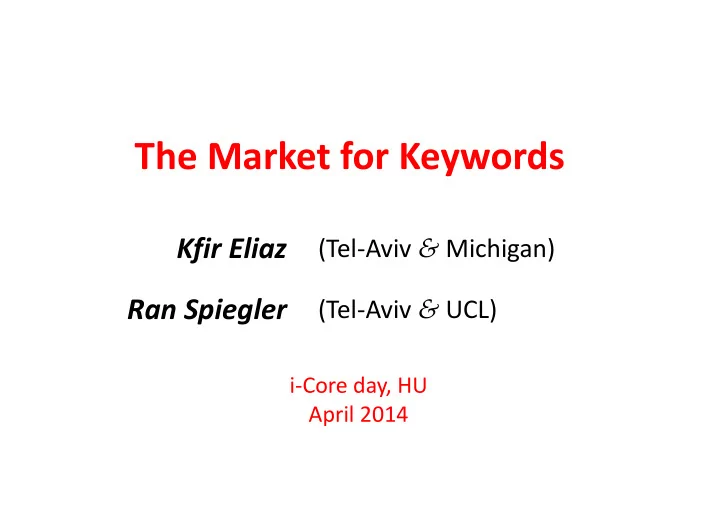

The Market for Keywords Kfir Eliaz (Tel ‐ Aviv & Michigan) Ran Spiegler (Tel ‐ Aviv & UCL) i ‐ Core day, HU April 2014
Motivation Economic literature on sponsored links: Mechanisms for allocating advertisers to keywords. • Single keyword – Users have perfect ability to describe • what they want. We examine a multi ‐ keyword environment, where users have limited ability to describe wants (misspellings, synonyms, categories, vague queries).
In our model: A (benevolent) search engine addresses this limitation by “broad match design”: when a user submits the query “w”, he also gets advertisers that paid the market price of a different word v. Our question: Can competitive market allocation of advertisers to keywords attain an efficient outcome, under suitably designed broad match? “Competitive equilibrium” methodology (as opposed to mechanisn design)
Model: Primitives is a set of (at least 2) products. • Each product is produced by a measure 1 of firms. • is a set of words, . • A consumer type is a pair . • is the (only) product the consumer likes. • is the (only) word he can express (his “vocabulary”). •
Model: Primitives Distribution of consumer types The popularity of � ���,�� Conditional query distribution � ����
Model: Primitives The value of a transaction for a firm is 1. • The value of a transaction for a consumer is 1 • for the product he wants; 0 otherwise. Consumer of type who decides to enter market, • submits query “ ”. ─ Gets a “search pool” consisting of measures of firms of different types. ─ Repeatedly draws (“clicks”) at random firms from pool with a constant search cost per click � � 0 .
Narrow match : consumers who query “ ” only get firms • that are willing to pay the market price ‐ per ‐ click p( ). Suppose both types (n, and (m, enter the market. • Since , m has a higher conversion rate, • hence a higher willingness to pay (per click) for . Competitive equilibrium will allocate to m firms; the • niche product n is crowded out.
Socially optimal consumers equilibrium under not served Narrow match
Broad match : Weighted directed graph over keywords
: The probability that a firm that paid for will enter the search pool of a consumer who submits .
�,� |� �,� �� Measure of � firms Linked to ∅ via � Measure of all firms Linked to ∅ via � ∗
∗ ∗ ∗ ∗ ∗
query gives firms that paid for An firm might want to buy word . This is the essence of the incentive problem of a competitive market for keywords with broad matching.
An firm should “outbid” an firm for word Number of transactions Number of transactions For firm � from word � For firm � from word � Number of “clicks” Number of “clicks” from word � from word �
Number of transactions Number of transactions For firm � from word � For firm � from word �
� � � � �∈��,�,∅� � �
The Bhattacharyya coefficient � � � � � • Direction cosine of angle between unit vectors �∈� and � � �∈� • Gets values in ; only if � � � � • Increasing with Blackwell garbling
General definition of market equilibrium Consumer types’ search decision Allocation of words to firm types The pair is a market equilibrium if: is optimal given the search pool of • induced by . is the (unique) firm type with the highest • given . The equilibrium price is .
. There exists ∗ that General Result . Let sustains an efficient market equilibrium iff � � that belong to the search pool of some in the efficient outcome.
Recommend
More recommend